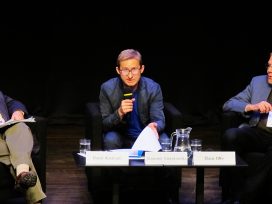
The migration crisis has triggered a shift in politics away from an ethics of ultimate ends to an ethic of responsibility, the question of the ‘we’ to whom we owe solidarity reappearing in pre-political concepts like ethnicity and national culture.

The migration crisis has triggered a shift in politics away from an ethics of ultimate ends to an ethic of responsibility, the question of the ‘we’ to whom we owe solidarity reappearing in pre-political concepts like ethnicity and national culture.
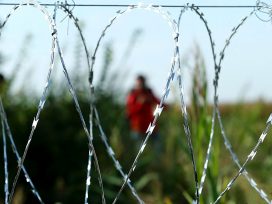
In a ‘flat world’ there is no longer a place for the sovereign right of national ‘non-inteference’, argues Ulrike Guérot. Europe must begin thinking about ‘network democracy’, in which social cohesion is organized beyond borders.

In a new economy, the contours of which we are only beginning to grasp – post-industrial, post-scarcity, post-work – what might the state look like? How will a society of people who do not “go to work” in a twentieth-century sense be governed? Are we in for a “new socialism” or for the dissolution of the traditional nation-state, and are these two scenarios really different? What will happen to those who do not fit into this brave new world?

Every generation of Ukrainians is confronted anew with the country’s historical traumas. However, Ricardo Dudda reports on the dangers of the past distracting reformers’ attention away from Ukraine’s future, especially where Russian propaganda seeks to distort the historical record.

Sloviansk is a grey city in eastern Ukraine. This was already the case, before pro-Russian separatists occupied it and the Ukrainian army brought it back under Kyiv’s control. But young people are now attempting to add some splashes of colour to the wasteland, not far from the frontline. And not only with paintbrushes. Above all, they want to change people’s mentality.

Ukraine was ranked 107th out of 180 countries in this year’s World Press Freedom Index. An improvement on 2015, but still indicative of the serious threats that the country’s journalists face. Cecilia Ferrara takes stock of recent developments in the new media landscape.
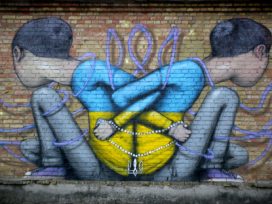
Russian speakers in Ukraine are part of the “Russian World”, Vladimir Putin repeatedly claims; which is how he legitimizes Russia’s intervention in the country. That said, every third Ukrainian speaks Russian. According to current surveys, 15 per cent indicate Russian exclusively as their native language, and 22 per cent both Russian and Ukrainian. But what is the real significance of language? In order to find out, Irina Serdyuk made her way to Khmelnytskyi, a city of 300,000 residents halfway between Kyiv and Lviv.
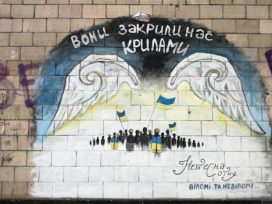
First a pro-EU revolution, now war with Russophile separatists and economic crisis, both ongoing: but what’s next for Ukraine? Sophia Christoforidou of the Greek media outlet “Inside Story” arrives in Kyiv to speak to people from many walks of life about their hopes and fears for the country’s future.

Researchers have been too quick to accept the premise that Russia is the second largest immigration state (after the United States). An uncritical stance towards this assertion leads us to ignore the specificities of the post-Soviet context of migration processes. In this context, the phenomenon referred to as “immigration” is, to a significant degree, the same thing as geographic mobility within the bounds of the former USSR. The people that belong to the two sides of this process that are referred to as host society and immigrants were until recently part of the same political and cultural community. What we have observed in the last quarter century is the process of becoming alien, of othering those who, in the memories of generations still living today, were either entirely or partially “ours”. In other words, we are witnessing an about-face in the process of constructing and reconstructing symbolic boundaries, which affects different groups in different ways.
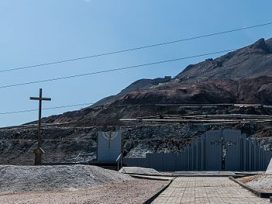
Recent cuts in higher education spending fuels the commodification of knowledge, the precarization of academic work, and de-solidarization within the scienitific community. Almantas Samalavicius of the Lithuanian journal Kulturos barai talks to Slovenian ethnomusicologist about Ana Hofman about neoliberalism and higher education.

Accommodate or confront? Either reaction allows rightwing populism to set the political agenda, argues Jürgen Habermas in interview. The Left must regain the initiative and offer a credible response the destructive forces of unbridled capitalism.

Trump’s win was far from unpredictable: the Clinton campaign failed to take popular resentment seriously. Whether or not Trump follows up on all of his many election promises, more conflict can be expected.

Hawk or dove? Donald Trump’s synthesis of populist isolationism and nationalist triumphalism produces an erratic and unpredictable stance on America’s international role. The foreign policies of populist precedents provide clues as to how Trump thinks about the rest of the world, according to Christopher Schaefer.

Whatever happens on 8 November, one thing is certain: the large bloc of disaffected voters represented by Donald Trump will not go away. His popularity reveals the fragility and entrenchment of the American democratic system, writes George Blecher.